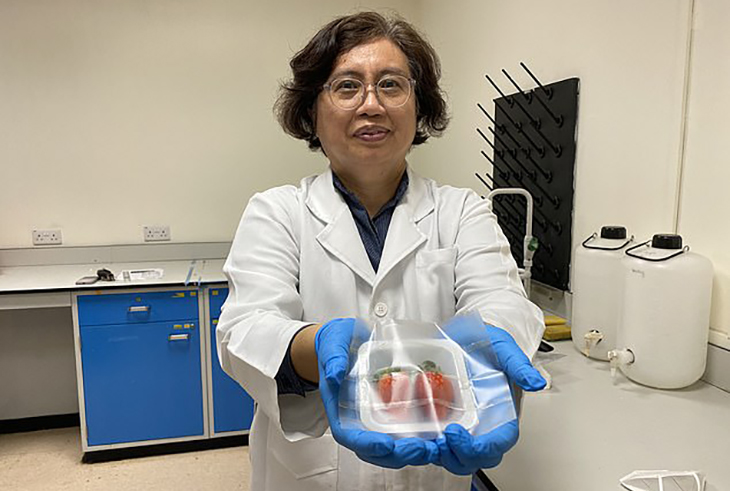Study Finds New Smart Packaging Stops Food Poisoning While Also Helping Save The Planet

There seems to be yet another innovative invention that came out of Singapore’s Nanyang Technological University (NTU).
According to a new study, this ‘smart’ type of food packaging could possibly eradicate food poisoning. Scientists report that the food wrapping can kill harmful bacteria such as Salmonella, E.coli and listeria, therefore keeping fruit, vegetables, fish and meat fresher for longer periods of time.
This waterproof wrapping could also work towards a more sustainable environment by reducing waste, they also claim. While it looks just like plastic, it’s actually biodegradable.
Professor Mary Chan, project co-leader from NTU Singapore shared, “This invention would serve as a better option in the food industry.”
“It has demonstrated superior antimicrobial qualities in combating a myriad of food-related bacteria and fungi that could be harmful to humans,” she adds.
She also said, “The smart release of antimicrobials only occurs when bacteria or high humidity is present. It provides protection when needed – this minimizing the use of chemicals and preserving the natural composition of foods packaged.”
The scientists explain that the transparent material of the food packaging is made from starch, which is a type of corn zein, as well as other naturally derived biopolymers.
In addition, it is also infused with a variety of anti-microbial compounds that are found in plants. They also had oil from thyme, which is a commonly used herb in cooking, as well as citric acid that’s found in grapefruits and oranges.
The research group also did experiments where they found that only tiny amounts were released when exposed to humidity, or when it came into contact with enzymes from bacteria and fungi that tend to contaminate food. What this does is ensure that the packaging has the ability to endure several exposures and can last for months at a time.
The chemicals can destroy any bacteria that grow on the packaging’s surface, and on the food product itself. When testing it on strawberries, they managed to stay fresh for at least seven days before they developed mold, which was three days longer than strawberries left in the usual plastic boxes or packaging.
As for co-project leader, Professor Philip Demoktritou, from the Harvard TH Chan School of Public Health in Boston, he said, “Food safety and waste have become a major societal challenge of our times with immense public health and economic impact which compromises food security.”
He added, “One of the most efficient ways to enhance food safety and reduce spoilage and waste is to develop efficient biodegradable non-toxic food packaging materials.”
He also explained, “In this study, we used nature-derived compounds including biopolymers, non-toxic solvents and nature-inspired antimicrobials and develop scalable systems to synthesize smart antimicrobial materials. They can be used not only to enhance food safety and quality but also to eliminate the harm to the environment and health and reduce the use of non-biodegradable plastics at global level and promote sustainable agri-food systems.”
Notably, the biggest consumer of synthetic plastics that are derived from fossil fuels is the packaging industry. It also accounts for the major amount of plastic waste that happens to be polluting the environment.
CEO of Singapore company ComCrop, Peter Barber, that happened to pioneer the urban rooftop farming, shared, “The NTU-Harvard Chan School food packaging material would serve as a sustainable solution for companies like us who want to cut down on the usage of plastic and embrace greener alternatives.”
“As ComCrop looks to ramp up product to boost Singapore’s food production capabilities, the volume of packaging we need will increase in sync, and switching to a material such as this would help us have double the impact. The wrapping’s antimicrobial properties, which could potentially extend the shelf life of our vegetables, would serve us well,” he added.
In addition, he shared, “The packaging material holds promise to the industry, and we look forward to learning more about the wrapping and possibly adopting it for our usage someday.”
Moreover, Prof Chan also expounded on how this will have huge positive environmental implications since it is a much better alternative. The focus is to eventually replace all conventional forms of plastic packaging with this new material, that will also have the ability to double the shelf life of produce, lessening food waste as well.
She iterated, “Vegetables are a source of wastage because even if they are refrigerated, they will continue to respire, leading to spoilage after a week or two. With the anti-microbial packaging, there is a chance to extend their shelf life – and also make the vegetables and fruits looks fresh with time.”
Later on, the team hopes that they can scale up the technology by taking an industrial partner so that it can become a commercialized product in a few years.
You can see the study outcome published in the ACS Applied Materials & Interfaces journal.



